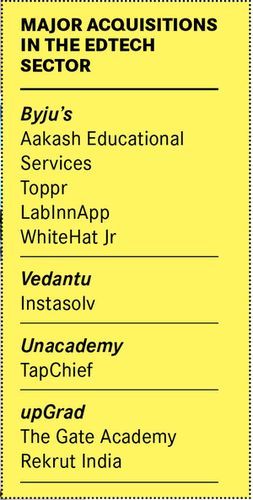The Indian edtech industry attracted investments worth $2.1billion in 2020. It had got just $1.7 billion in the whole decade before that, according to a recent report by Anand Rathi. The increased interest of investors and the inflow of money have resulted in several mergers and acquisitions in the sector.
On March 5, Bengaluru-based edtech decacorn Byju’s said it had closed a deal to acquire exam preparation firm Aakash Educational Services for nearly $1 billion. The stock-and-cash deal was the biggest in the education space. Byju's had earlier acquired competitor Toppr, virtual simulation startup LabInnApp and coding startup WhiteHat Jr. Bengaluru-based online tutor Vedantu acquired doubt-solving platform Instasolv in February, and online higher education company upGrad acquired coaching institute The Gate Academy.
“The mergers and acquisitions in the edtech space would help create a better education ecosystem with newer possibilities for collaborative synergies,” said Mayank Kumar, cofounder and MD of Mumbai-based upGrad. “It will be beneficial to both the end consumers and the edtech players. Last year, we acquired a recruitment firm, Rekrut India, to increase career outcomes for our learners. This has opened the floodgate of career opportunities for our learners.”
Most of these platforms have been growing at breakneck speeds after the pandemic forced authorities to close schools and colleges, and students got stuck at homes. As it might not be possible for them to maintain the momentum once campuses are open, they are preparing themselves for that eventuality. upGrad, for instance, has made a foray into the test preparation market by acquiring The Gate Academy, which has some 50 centres across India. It has been rebranded as ‘upGrad Jeet' and will focus on the Hindi-speaking small-town folks who are looking for mid-scale government jobs. Byju’s acquisition of Aakash is also with a long-term plan. Aakash has more than 200 brick-and-mortar centres and a student count of 2.5 lakh.
“To gain a competitive edge in the market, companies tend to acquire competitors who have a suitable intellectual property like customised content, learning platform, innovative pedagogy and learner base. Through such mergers and acquisitions, companies can now reach a wider audience and change the traditional school curriculum, thereby extending quality education and top-notch educators to learners,” said Vamsi Krishna, CEO and cofounder of Vedantu. He said his company’s acquisition of Instasolv would reinforce its presence in tier II and tier III markets where access to quality teachers was a challenge.
The synergies were quite evident when Bengaluru-based Unacademy recently acquired TapChief, a professional networking platform. It has some 1.5 lakh registered professionals who use the platform to collaborate with a host of experts from their domains and take up short-term projects. “TapChief shares a similar ethos in a different space, as evident from the open community of professionals and learners,” said Gaurav Munjal, cofounder and CEO of Unacademy Group.
Experts say consolidation in the edtech sector can help solve the problem of scarcity of resources in the education sector. For instance, there is a shortage of quality English teachers in India. “Mergers and acquisitions help us solve this scarcity issue better by utilising the resources and goodwill for an existing brand to provide the perfect edtech solution that benefits end users,” said Deepak Ananthakrishnan, chief customer officer of the edtech platform S2M. “Long sale cycles set edtech back as it can take years to test, sell and improve an edtech product. Mergers and acquisitions ensure that these products reach the end consumers and aren’t stalled due to lack of funds, business acumen or testing facilities.” S2M recently acquired MultiStory Learning, the boutique kids’ content company in Chennai. “This acquisition has brought in a decade of experience in kids’ content management and education product building experience,” said Ananthakrishnan.
Most of the edtech platforms in India have different capabilities that cater to the different needs of customers. The industry still is fragmented in both business-to-business and business-to-consumer spaces, and there is huge scope for further consolidation. “Whether consolidation will lead to a few monoliths in this space is something that we will have to wait and see,” said Kumar. “Alliances will help larger edtech players expand their total addressable market by venturing into new learner demographics and explore new markets, especially in tier II and III cities. In turn, this will also enable several entrepreneurs with wider industry penetration and significant resources for future growth. Other benefits range from penetration into new markets, new product innovations and expanding the customer base.”



